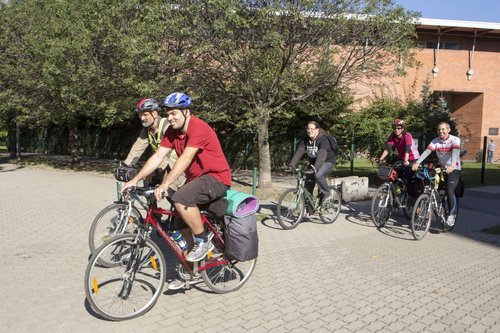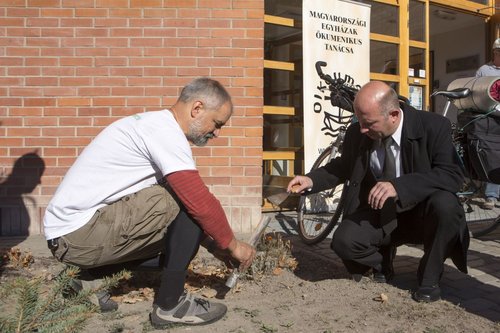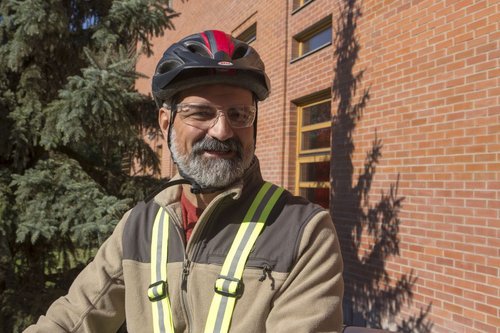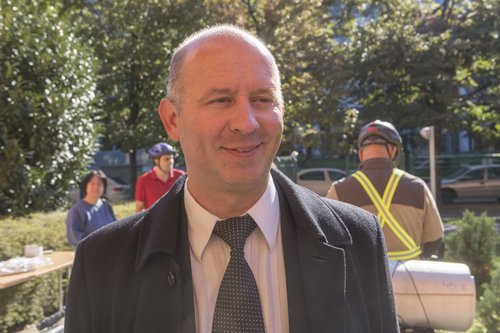Bicycling for your neighbour, goes the motto of a group of Hungarian cyclists from the Carpathian Basin, who set out on bike during the Week of Creation, travelling from east to west. The cycling relay, taking place between Beregszász (Berehove, Ukraine) and Sopron, Hungary, is part of the Ecumenical Pilgrimage in Europe, whose final destination is the United Nations Climate Change Conference to be held in Paris at the end of this year. A report by Parókia Portal.
People from all around the world are joining a pilgrimage for climate justice, which has been organized by the World Council of Churches (WCC). The pilgrims, some on foot, others by bicycle, are expressing their solidarity with their neighbours who are gravely affected by the effects of climate change. Similarly, a group of European Christians wish to express their unity and willingness to act, by participating in a relay pilgrimage, which will reach Paris at the end of November, in time for the beginning of the twenty-first United Nations Climate Change Conference. The pilgrims wish to stand up for a more fair and sustainable form of coexistence. The conference is significant because members of the UN are planning to adopt a resolution to reduce greenhouse gas emissions to such an extent that it would limit the global temperature increase to 2 °C above pre-industrial levels.

As pointed out during a programme this year organized by the Ecumenical Working Group for Creation Protection, which operates in Hungary, riding a bicycle emits 10 times less carbon dioxide than does driving a car. If all of us in Europe chose to cycle just 5 kilometres a day, we could reach half the goal of the Transport Sector’s carbon-dioxide reduction plan by 2050, thus reducing the greenhouse effect, the frequency of extreme weather conditions, as well as the destruction of the living space of those inhabiting developing countries.
The bicycle pilgrimage in the Carpathian Basin, called “Bicycling for your neighbour,” coincides with the Week of Creation, meaning it is taking place at present. The pilgrims left from Beregszász (Berehove, Ukraine), and after visiting the Hungarian cities of Kisvárda, Tokaj, Budapest, Pannonhalma, as well as various smaller towns, they are going to arrive in Sopron, which lies on the Hungaria-Austrian border. The reason this city has been chosen as the end point is that its Lutheran church hosts the Ecumenical closing worship of the Week of Creation. The pilgrimage will be continued by our Austrian brothers and sisters towards Germany.

At each stop, the pilgrims put a handful of soil, taken from where they live, into a thin vessel. This symbolic act was also performed in Budapest on Thursday morning. The cyclists assembled in front of the offices of the Ecumenical Council of Churches in Hungary (ECCH), where they were greeted by Lutheran pastor Vilmos Fischl, General Secretary of ECCH, who said a prayer and blessed the participants. Five pilgrims undertook the journey from Budapest to Tata, while the previous weekend there were about fifty to sixty cyclists who rode together.
Those setting out from Budapest shared their thoughts with us on what drives them. “My bike is indispensable to me in my everyday life. I use it whenever and wherever possible, and it is also my hobby. During the weekends, I ride it in the mountains, spending my summer holiday this way. Apart from the fact that bicycling is my passion, I am also glad that I can contribute to the protection of the created world by choosing not to drive a car,” answers Ivett Csontos, a Methodist participant of the pilgrimage.
“Our actions have an impact on the environment, but our actions are not for themselves: we perform them in order to achieve our goals. But our goals are not for themselves, either. They stem from our values, which in turn originate in our faith and convictions. Therefore if you are encouraged to ride your bike more often, and you are thinking merely on the level of actions, you look outside the window and say: “Not now, it’s windy and cold outside.” If, on the other hand, this resolve has a basis in the depths of faith, you find yourself to be a lot more determined, and the changes are more permanent,” says Gábor Rohály.

As the head of “Naphimnusz” Creation Protection Association, a Catholic organization, points out, there is an increasing amount of emphasis on creation protection in Catholic circles. “On Tuesday, a conference was held in the Hungarian Parliament’s Upper House Hall entitled ‘The Created World is our Common Home,’ with the participation of church and political leaders. Already in 2008, the Hungarian Catholic Bishops’ Conference issued a circular letter called ‘Our Responsibility for the Created World,’ which is actually a significant study. And early this summer, Pope Francis issued an encyclical on the protection of creation, copies of which we distribute at each stop of our journey. The aim of our association is to encourage individual communities to consciously work on the issues discussed in higher circles.” Speaking about the Ecumenical pilgrimage, Gábor Rohány added: “Pope Francis wrote the encyclical not only to Catholics, but to everyone. The protection of our common home is an issue that concerns each and every one of us, and if we want to make a stand for the world, we have to participate in this cycling pilgrimage together.”
“All over the world, this week is celebrated as the Week of Creation. The question arises what it is that we are celebrating. The world is becoming increasingly aware that unless we preserve our created world, we will cause great harm that cannot be undone, because currently we are using far more of our resources than necessary. This cycling campaign highlights that we are covering this great distance using our strength, taking into consideration our potential, at times at a painful cost. We wish to draw people’s attention to the fact that this world has been given to us by God. And to get this important message across, we need to use any means necessary, including bicycles and promotion T-shirts,” said Vilmos Fischl to the reporter of our web portal. The General Secretary of ECCH also shared with us the fact that he himself also rides a bike on a regular basis: he cycles around the major lakes of Hungary every year, and he also swims across them. “I frequently take pilgrimages to Lakes Balaton, Tisza, Fertő and Velence, which gives me the opportunity to reflect on certain issues and clear my head.”

„This Ecumenical bicycling pilgrimage is not only about cycling, but also about encounters,” remarks Reformed pastor Tamás Kodácsy, one of the organizers. “We have visited communities in Tata, Pannonhalma and Répcelak which are sensitive to the protection of creation, such as the Reformed congregation or the Reformed secondary school in Tata.” The international Ecumenical pilgrimage initiated by WCC was launched by the Norwegian Church, and later joined by German, Dutch and Scottish churches, members of which set out to Paris on foot,” the pastor explains. “With our participation, the original north-south direction is complemented by an east-west one, therefore when we hand over this “baton”, it will symbolize a larger area of Europe, providing a greater support base for the church leaders participating in the climate summit. This is why it is so significant that Sub-Carpathia, Hungary and Austria were able to join the programme, while Slovakia and the Czech Republic contributed with other actions.
According to Tamás Kodácsy, regardless of the efforts made, the Paris climate change conference will not reach the desired result as far as the reduction of carbon-dioxide emission is concerned. “We are aware that this goal will not be achieved, while we also know how important it would be to succeed. And yet we are still trying to make a change – not at multinational corporations or large economic systems, but on the level of individual lifestyles. This may be a mere drop in the ocean, but at least it is a step forward. Our aim is to voice our hope which can defeat apathy. This is the duty of the church.”
Text by Ágnes Jakus/ Parokia.hu
Photos by Vargosz
Translated by Erzsébet Bölcskei